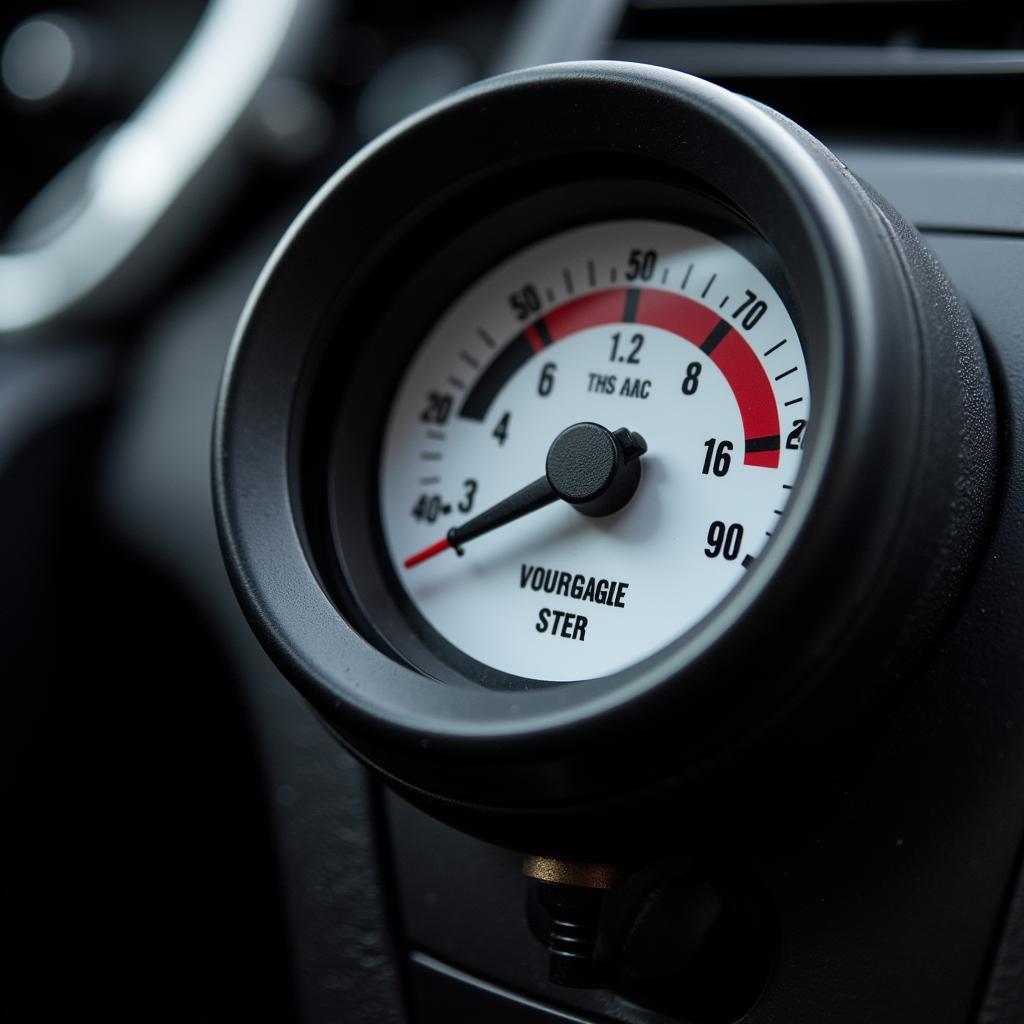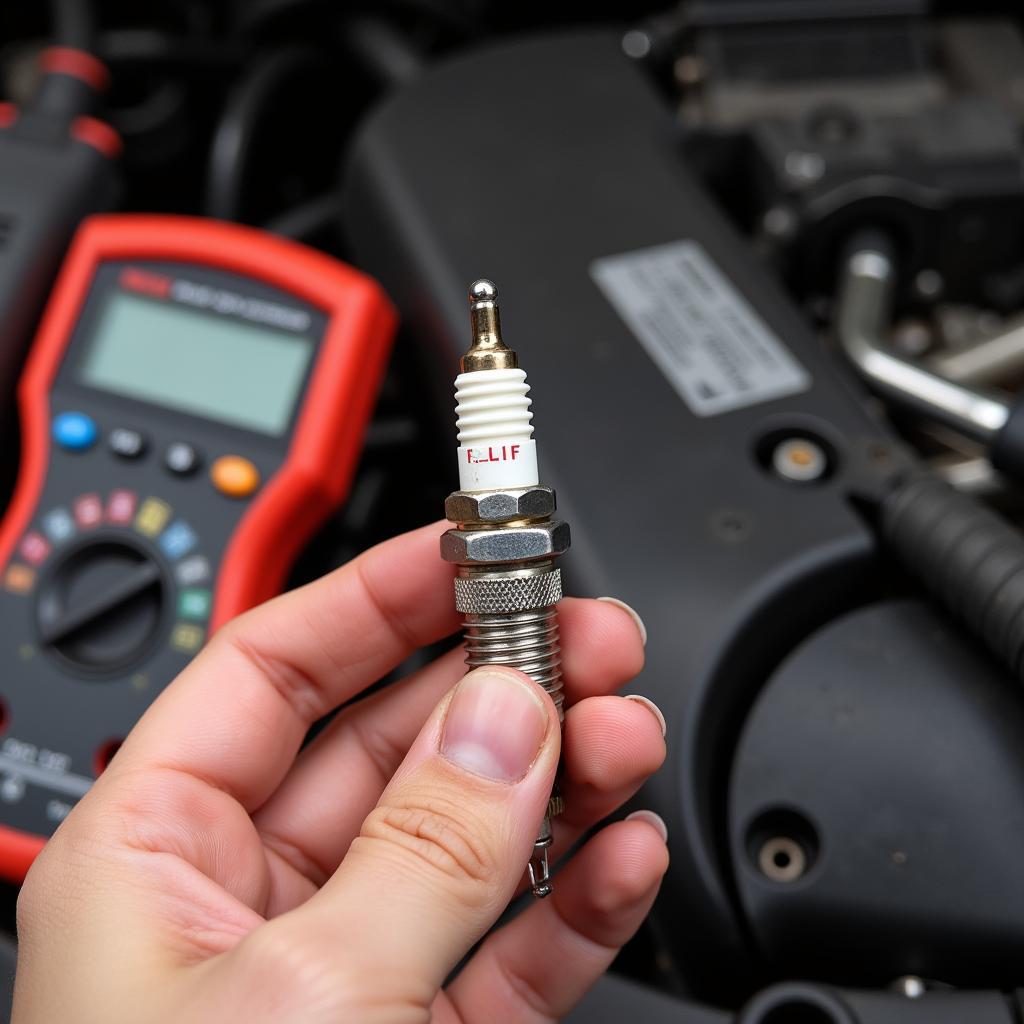You turn on your car AC on a scorching summer day, expecting a blast of cool air, but instead, you’re met with lukewarm disappointment. One possible culprit for this AC agony? An overcharged system. “How to fix a car AC that is too full” might be the question swirling in your mind. Don’t sweat it! This guide will walk you through the potential issues and provide step-by-step solutions to help you regain that refreshing chill.
Understanding the Risks of an Overcharged AC System
Before we dive into the fixes, it’s crucial to understand why an overly full AC system is detrimental to your car. Think of your car’s AC as a finely tuned orchestra – each component needs to work in harmony for optimal performance. Overcharging throws a wrench into this delicate balance, leading to:
- Reduced Cooling Efficiency: Excess refrigerant disrupts the pressure balance within the system, hindering the refrigerant’s ability to absorb heat efficiently. This results in lukewarm air blowing from your vents.
- Compressor Damage: The compressor, the heart of your AC system, works harder to circulate the overcharged refrigerant. This strain can lead to premature wear and tear, ultimately resulting in costly compressor failure.
- System Leaks: The increased pressure from overcharging can stress the system’s components, making them more susceptible to leaks. Refrigerant leaks are not only environmentally harmful but can also lead to expensive repairs.
Identifying an Overcharged AC System
Recognizing the symptoms of an overcharged AC system is the first step toward a solution. Here are some telltale signs:
- Warm Air from Vents: This is often the most noticeable symptom. If your AC is blowing warm air, especially after running for a while, it could indicate an overcharged system.
- Unusual Noises: Listen for any hissing or gurgling sounds coming from the AC system, particularly near the compressor. These noises can indicate high pressure within the system.
- Compressor Cycling On and Off: An overcharged system can cause the compressor to cycle on and off frequently. This rapid cycling is a red flag for potential issues.
How to Fix an Overcharged Car AC System
 Car AC Gauge Showing Overcharged System
Car AC Gauge Showing Overcharged System
Important Note: While the following steps offer a general guide, working with refrigerant requires specialized knowledge and tools. If you’re not comfortable handling these procedures, it’s best to consult a qualified mechanic.
1. Gather Your Tools and Safety Gear:
- Refrigerant Gauge Set
- Safety Glasses and Gloves
- Refrigerant Identifier
2. Identify the Refrigerant Type:
Locate the sticker under your car’s hood that specifies the type of refrigerant used in your AC system (e.g., R-134a). Using the correct refrigerant is crucial to avoid system damage.
3. Connect the Gauge Set:
Following the manufacturer’s instructions, connect the gauge set to the low and high-pressure service ports on your AC system.
4. Assess the Pressure Readings:
With the engine running and the AC on its highest setting, observe the pressure readings on the gauge set. Compare these readings to the manufacturer’s specifications for your specific car model. High pressure readings on both the low and high sides typically indicate an overcharged system.
5. Safely Release Excess Refrigerant:
Caution: Refrigerant is harmful to the environment and can cause frostbite. Work in a well-ventilated area and wear safety glasses and gloves.
Using the gauge set, slowly and carefully release small amounts of refrigerant from the high-pressure side. Monitor the pressure readings closely as you do this, ensuring you don’t completely empty the system.
6. Recheck Pressure and Add Refrigerant (If Needed):
After releasing some refrigerant, allow the system to stabilize and recheck the pressure readings. If the pressure is still too high, release small amounts of refrigerant until it reaches the recommended range. If the pressure is too low, you’ll need to add the correct type and amount of refrigerant using a refrigerant charging kit.
7. Test the AC System:
Once the pressure is within the appropriate range, disconnect the gauge set and test your AC system. The air blowing from the vents should be noticeably cooler.
Preventing Future Overcharging
 Mechanic Inspecting a Car AC System
Mechanic Inspecting a Car AC System
- Regular AC Service: Just like your engine oil, your AC system benefits from regular maintenance. Have your system inspected and serviced by a qualified technician at least once a year, or as recommended in your car’s owner’s manual.
- Address Leaks Promptly: If you suspect a refrigerant leak, get it diagnosed and repaired as soon as possible. Ignoring leaks not only leads to poor AC performance but also harms the environment.
- Choose Qualified Technicians: When it comes to AC repairs or recharges, opt for experienced and certified technicians. They have the expertise and equipment to diagnose and address issues accurately.
FAQs About Overcharged Car AC Systems
1. Can I drive my car with an overcharged AC system?
It’s not advisable to drive your car with an overcharged AC system for extended periods. The added strain on the compressor and other components can lead to more severe damage over time.
2. How much does it cost to fix an overcharged AC system?
The cost to fix an overcharged AC system varies depending on the severity of the issue and the labor rates in your area. However, addressing the problem promptly is generally more cost-effective than ignoring it and risking more costly damage.
3. Can I recharge my car AC system myself?
While DIY recharge kits are available, it’s generally recommended to have your AC system recharged by a qualified technician. They have the expertise and tools to ensure the correct type and amount of refrigerant are added.
4. How often should I recharge my car AC system?
Unlike other fluids in your car, the AC system is a sealed unit. It shouldn’t require frequent recharges unless there is a leak. If you notice your AC performance declining, consult a technician to diagnose the issue.
5. What are some signs of a refrigerant leak in my car AC system?
Signs of a refrigerant leak include a hissing sound near the AC components, oily residue around the AC fittings, and a noticeable decrease in cooling performance over time.
Don’t Let AC Troubles Ruin Your Drive!
“How to fix a car AC that is too full” is a question best answered by experienced professionals. At AutoTipPro, we understand the importance of a comfortable drive, especially during hot weather. Our team of certified technicians is equipped to diagnose and repair all your car AC woes. Contact us today at +1 (641) 206-8880 or visit our office at 500 N St Mary’s St, San Antonio, TX 78205, United States, and let us help you beat the heat!






Leave a Reply